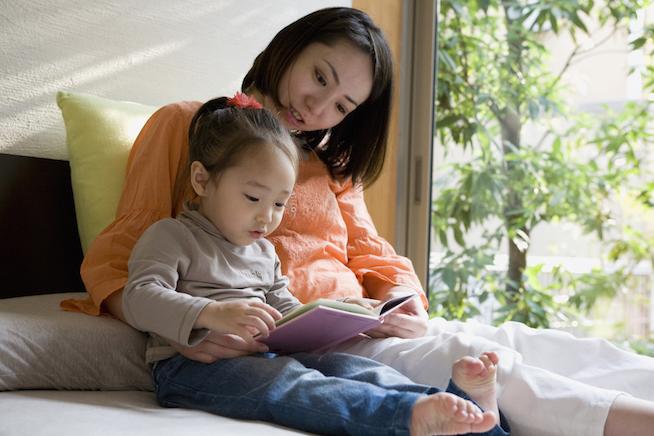
Reading is kind of the best.
If you find the right books, they can be as entertaining, interactive, and mind-blowing as anything you can find on your iPad. But, if your child drops their book into the toilet, leaves it in a restaurant booth, or tries to eat it, it’s no big deal.
Every parent has their own personal toolbox — the items that make their day-to-day lives just a little bit more manageable. For some, that toolbox might include disposable baby wipes or generous portions of night-time Benadryl. For others, it could feature “that bag with the strap that doesn’t dig into my shoulder” or “the white noise machine that keeps my kid asleep even when the phone rings.” Personally, my all-time favorite “parent toolbox” item has been — and always will be — books.
Books can be a remarkably useful resource for parents, but I don’t mean “useful” in the faux-lifestyle advice, What to Expect When You’re Expecting sense. Children’s books — the books we share with our children — can actually make your job as a parent EASIER, which is amazing, considering they are essentially some pieces of paper glued together.
So, while some caregivers will wax rhapsodic over their BPA-free water bottles or new Parisian-style parenting philosophy, here are six ways that I truly believe that books can be a parent’s best friend:
1. Books Sound More Authoritative Than You Do
This wounds my parental ego to admit, but — in first grade, every single day, my daughter would ask if there was going to be a tornado. And I’d say “No,” and she wouldn’t believe me. I then started giving her books about tornadoes and, after doing some independent research, she stopped asking about them. Because, unlike me, the books sounded like they actually knew what they were talking about.
2. Books Inspire and Reward Curiosity
Here’s another thing the tornado issue taught me: Curiosity is an admirable trait in a kid (to a certain extent). You want to set up opportunities that allow them to investigate ideas, topics, and the world around them ON THEIR OWN. This is where books come in. Books are safe ways to let your children intellectually explore; they’re little windows into reality that you can just leave sprinkled around your house. Your child can grab a book off a shelf, retreat into a secret hiding place, and learn about myths, history, shark attacks — whatever they want. They start with visual browsing (i.e. looking at the pictures), and, once they learn how to read, they can fully satisfy their curiosity without you acting as a gatekeeper. (And, with non-digital books, you don’t have to worry that your kid’s private exploration time will lead to them unwittingly setting up an Ashley Madison account.) Parents complain about kids asking “why?” all the time. Books teach kids how to answer that question themselves. That’s awesome.
3. Books Let You Hold Onto Your Phone
I like my smartphone. Sometimes, I actually use it for practical reasons, like mapping our route home or actually calling people. That said, maybe 80% of the total apps on my phone were downloaded by my daughter. Phones have become this de facto “anti-boredom” tool for parents lately. “Wait, we have to stand in line for 10 minutes? Here, sweetie, you better get started watching Minecraft videos . . . ” With that in mind, I’ve been trying to always toss some books or comic books into the car for exactly those situations. If, as parents, we find ourselves always in need of a weapon of mass distraction, we can do better than throwing devices at our children. Using books in those situations strengthens their reading comprehension and attention span, and — if I’m being honest — it lets us keep our phones for ourselves. We paid for them! We should be the one who get to play Angry Birds, right?
4. Books Teach Kids about Comedy
YouTube unboxing videos are not funny. Most Nickelodeon TV shows are not funny. Mo Willems’ Don’t Let the Pigeon Drive the Bus is funny. Lane Smith’s The Happy Hocky Family is funny. B.J. Novak’s The Book With No Pictures is funny — like legitimately, hysterically funny, in a really smart way. If you want to introduce your kids to what actual comedy looks like (and they’re still too young to watch Mel Brooks or Monty Python), the absolute best place to start is with books.
5. Books are Risk-Averse
If you find the right books, they can be as entertaining, interactive, and mind-blowing as anything you can find on your iPad. But, if your child drops their book into the toilet, leaves it in a restaurant booth, or tries to eat it, it’s no big deal. Try those same things with a tablet or smartphone and . . . yeah, much higher stakes. (Better battery life on a book, too.)
6. Books Help Kids Talk about Abstract Concepts
There are many wonderful books for kids that are focused on things like colors, friendships, feelings, art — topics that are vitally important to young children, but that are also, at their core, really abstract. Children’s authors are experts at taking those hard-to-express concepts and figuring out how to capture them in ways that young minds can understand. So, when you sit down with your child and you’re reading these books that help them visualize or verbalize abstract concepts — fear, death, joy, you name it — you’re also giving them a vocabulary, an infrastructure, which they can use for the rest of their lives when they’re struggling to discuss topics like pain, loss, joy, and love. Books give children their emotional training wheels. Books give kids the means to express what they’re feeling on the inside, which, as they get older, is just as remarkable a gift for the parents as it is for the kids.








